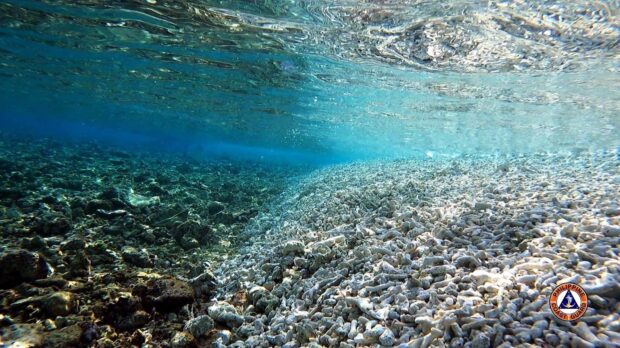
A recent survey conducted by the Philippine Coast Guard (PCG) in Escoda (Sabina) Shoal in the West Philippine Sea shows the destruction of the coral bed in the area, which has been blamed on the Chinese. (Photo from the Philippine Coast Guard)
MANILA, Philippines — After the positive results of Australia’s coral reef projects in Zambales, Pangasinan, and Palawan, the acting head of Australia’s mission in the Philippines said it may be possible to expand the two country’s marine program to include Rozul Reef in the West Philippine Sea.
“There’s no specific plan for that at the moment,” said Moya Collett, Canberra’s acting head of mission in the Philippines. “But I think there’s potential for us to do that through our existing marine cooperation program.”
“I think there’s potential for it because we’re doing a lot of things, but two things in particular for reef restoration and also monitoring of marine environment as a whole,” Collet said at a forum on Wednesday.
Canberra has led coral reef restoration projects in Pangasinan, Zambales, and Palawan employing technologies used in preserving the Great Barrier Reef in Australia, and they have yielded great results, Collet added.
Collet said large areas of coral reefs have been restored and the newly grown corals have the potential to be “more climate resilient” and bolster the return of fish to reef systems that were earlier found to have died.
When asked if the embassy is considering expanding the program to Rozul, Collet said “so we recently handed equipment to the Philippines. Some of them for monitoring. So I think there’s potential to do that more broadly.”
Continuing destruction
The possibility of doing a similar project in Rozul Reef was raised after the Philippine Coast Guard reported early this month that a fleet of Chinese vessels was spotted at Rozul Reef and Escoda Shoal in the eastern part of the Spratly Islands and videos later showed that the coral in the two reefs were totally destroyed.
Jay Batongbacal, director of the University of the Philippines Institute for Maritime Affairs and Law of the Sea, pointed out that since 2012, satellite imagery has shown continuing destruction in the West Philippine Sea believed to be linked to China’s artificial island-building within the Philippines’s 370-kilometer exclusive economic zone.
He estimated that over 5 square km (500 hectares) in Panatag (Scarborough) Shoal had been destroyed between 2012 and 2015 alone. But he said, there is a need “to quantify and evaluate” the full extent of the damage.